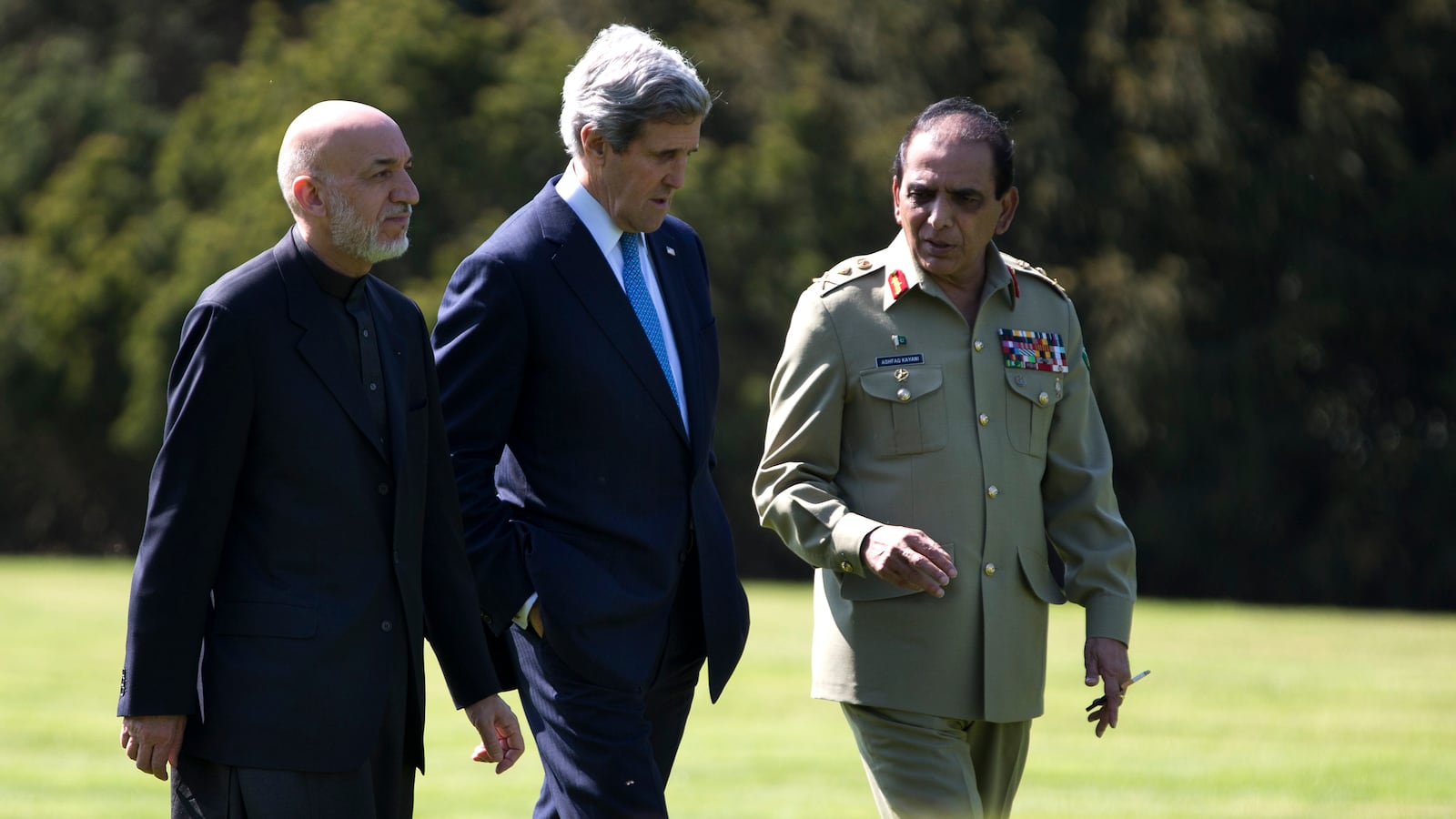U.S. Secretary of State John Kerry’s diplomatic initiative to host talks between Afghan and Pakistani leaders in Brussels this week was a timely step meant to reset tense relations between the two South Asian neighbors, and revive stalled talks with the Taliban as the 2014 deadline for the U.S. and NATO withdrawal from Afghanistan approaches.

With no immediate breakthrough on the horizon, the Secretary emerged after three hours of talks saying that both sides have "some very specific homework to do.” In other words, it may be naïve to expect quick results, but specific demands have been exchanged that require action within a specific time frame. The most challenging might be prodding Taliban leaders to enter talks.
Years of acrimony and mistrust have left the two countries suspicious of each other’s motivations, and without active and judicious U.S. and international participation in the political end-game, the heavy investments made since 9/11 to fight terrorism and help stabilize the region might end up being in vain.
Relations between Kabul and Islamabad have soured since February when it was announced at a trilateral meeting hosted by the British Prime Minister that a peace deal may be possible within six months.
Afghanistan expected some movement from Islamabad to nudge the Taliban, whose leadership resides in Pakistan, to enter into talks. But Kabul is now accusing Pakistan of “sabotaging the peace effort,” pointing to several areas of contention:
1. Attacks on security forces and civilians by militants allegedly using Pakistani sanctuaries.
2. Artillery shelling and related civilian deaths in Kunar and Nuristan border provinces and the construction of Pakistani border outposts on the Afghan side of the border.
3. Uncoordinated releases of ineffective Taliban detainees in Pakistan, who have since disappeared.
4. Pakistan’s reluctance to release key Taliban figures, including Taliban number two, Mullah Ghani Beradar, to facilitate talks.
The Pakistanis demand that:
1. Afghanistan extradite Pakistani Taliban leader Mullah Faqir Mohamad and rein in Mullah Fazlullah, whom both target Pakistan.
2. Deny Pakistani Taliban safe havens in Afghanistan from where they can attack Pakistan.
3. Afghanistan downgrades ties with India and reduces India’s footprint in the country, which Pakistan believes threatens its national security, and Afghans view as soft power projection.
4. Pakistan assumes a primary role in Taliban peace talks.
For their part, the Taliban refuse to talk to Kabul until all foreign troops leave, but want to re-engage the U.S. on the release of Taliban prisoners at Guantanamo.
The U.S., non-committal to releasing prisoners at this stage due to congressional oversight, insists the peace process be Afghan-led. This remains a contradiction until and unless the Afghan Taliban are pushed toward talks.
There is rising anxiety over shrinking timelines as Afghans deal with complex 2014 transition issues and hold the belief that the militants are buying time and merely paying lip service to peace overtures. They fear that if Afghanistan slips into crisis, instability and the rise of militancy will engulf the whole region.
Pakistan worries about further destabilization of its tribal areas and provinces bordering Afghanistan which would be incapable of accommodating large influxes of Afghan refugees.
Part of the problem can be traced to a historic border dispute. Contrary to Pakistani expectations, Afghanistan has never officially recognized the “Durand Line” as the international border with Pakistan, a boundary delineated by colonial Britain in the 19th century. Pakistan recognizes the international border and expects a de jure resolution of the issue. The unresolved dispute haunts both countries today in their inability to control the flow of militants across the border.
Also contributing to bilateral tensions is Pakistan’s use of Islamic extremists both during and after the Afghan-Soviet war, giving rise to the Taliban brand of extremism in Afghanistan and more recently empowering groups like the Pakistani Taliban who directly threaten Pakistan.
Afghanistan and Pakistan’s problems are reaching a tipping point. As much as policy-makers in Washington feel less invested in the Afghan endgame, the U.S. has few choices but to play a key role in assuring a relatively safe denouement by 2014 that would provide some assurance to both sides that the international community is committed to regional stability.
An extremist takeover would undoubtedly lead to wider ethnic and sectarian conflict instigated by emboldened armed militants in a region that holds nuclear weapons - hence Secretary Kerry’s urgent attempt to reset the dialogue.
The United States must focus on helping Afghanistan through the transition – albeit with respect to the country’s growing sovereignty - facilitate an eventless withdrawal and leave behind a manageable law and order situation. On these fronts, if there is any progress to be made in the little time left, President Obama should prioritize focused diplomatic engagement.
The first step, beyond Secretary Kerry’s timely mediation, is to appoint a new special envoy. The position of Special Representative for Afghanistan and Pakistan sits vacant since January. A new envoy should be high-powered and well-versed in dealing with sensitive geo-political intricacies to deal with Afghanistan’s transitional tantrums, Taliban rigidity, Pakistan’s uncertainty, regional complexities, coordination with international allies and relevant U.S. agencies to ensure that the endgame is not lost.






